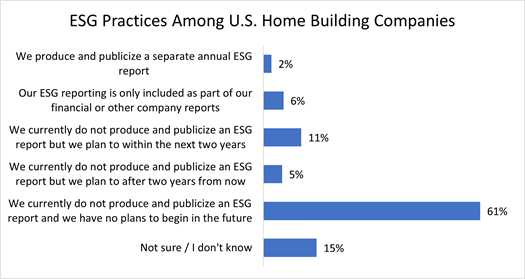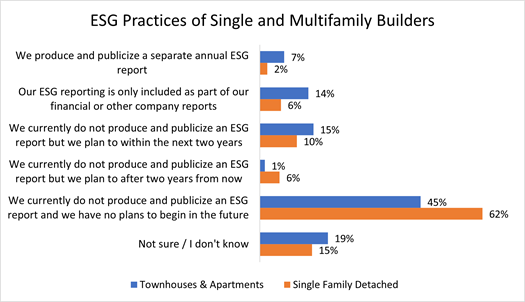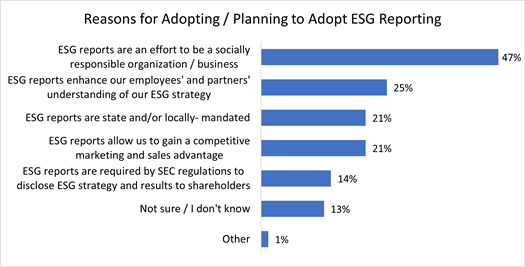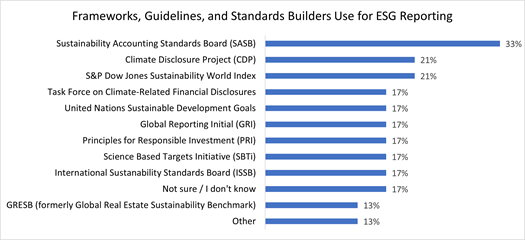Ed Hudson, MBA
January 18, 2024
ESG Reporting in the Homebuilding Industry
written by Ed Hudson & Linh Do
ESG (Environmental, Social, and Governance) reporting has become an increasingly popular way for companies to show their commitment to sustainability and social responsibility. Proponents of ESG reporting claim that adopting companies tend to be more competitive, profitable, have a happier workforce, and overall, have better prospects for long-term success, asserting that the ESG reporting process helps create a better-managed organization. Skeptics, on the other hand, question whether reverse-causation is at play here—perhaps better-managed and more successful companies are choosing to implement ESG strategies, and ESG is the result of good management and not the cause of it.
The construction industry has been described as a “laggard” industry because it appears slow to adopt beneficial technologies and construction practices. Many have wondered whether the home construction industry, numerically dominated by smaller, privately held companies, will be quick to embrace ESG strategy or cautiously observe until its value is proven or it becomes a requirement. In an effort to track diffusion of this practice among home builders, Home Innovation Research Labs, in collaboration with Professional Builder Magazine, surveyed 300 home builders in September 2023 about their current and anticipated ESG reporting practices and motives for adopting ESG reporting.
ESG Reporting
Participants were asked how their business handles the creation and promotion of an annual ESG report. Six descriptive options were provided, and respondents were asked to select the one that describes the status of ESG in their company. The survey found that about 8% of companies surveyed were either 1) publishing a separate ESG report or 2) including ESG in their existing financial reports. Sixteen percent of respondents were planning to begin ESG reporting in the foreseeable future. The remaining 75% reported either having no future plans or were uncertain about their company’s future ESG reporting.

National and multifamily builder categories undoubtedly recognize ESG reporting’s importance for financing and alignment with investor values. Not surprisingly, a home builder’s geographic operating scope was strongly associated with their stance on ESG: 45% of national builders said they practice ESG reporting currently compared to 16% of regional builders and 5% of local builders. Reporting also differed by type of housing units produced: multifamily builders were more than twice as likely (20%) to claim some form of ESG reporting compared to single family detached builders (8%). While the larger size and extensive operations of multifamily companies likely contribute to their head start in ESG strategy, we also suspect that the location of apartments and townhouses—typically in more densely populated areas—plays a role, given the more developed land-use regulations in such areas.

Regionality seems to play a moderate role as well—builders in the West (11%) were more likely than builders in the South (6%) to employ ESG reporting. Looking into the future, builders in the West (30%) and Northeast (24%) said they are planning to adopt ESG reporting compared to 17% in the Midwest and 14% in the South. While not always the case, this study aligns with the adage that trends begin at the coast and work their way inland.
Why Report on ESG?
Respondents who either currently employ, or plan to employ ESG reporting, were asked about the primary motivation for doing so. The top reason, by a sizeable measure, was “to be a socially responsible organization” (47%). This supports the belief that “true believers” in sustainability and social responsibility are leading this trend, not those reacting to mandate, market trend, or competitive necessity. In the #2 position was “enhancing our employees’ and partners’ understanding of our ESG strategy” at 25%, which indicates that those in this group feel some pressure to voice their social responsibilities to these groups.

Following in the 3rd and 4th position at 21% each were “state and/or locally-mandated” and “to gain competitive marketing and sales advantage.” The fact that about 1 in 5 are using it to gain competitive advantage shows that ESG reporting may already be having some influence on the market, who is supporting social responsibility by purchasing from those who demonstrate it.
While ESG reporting is currently neither SEC-required nor state- or locally- mandated, Michelle Foster, VP of Sustainability at Home Innovation Research Labs, believes that some builders may be adopting ESG reporting because they anticipate SEC requirements or government mandates in the foreseeable future. This seems to be especially true among National and Regional Builders (about 25% say they report because it is SEC-mandated) vs. only 8% of local builders who say the same. Further, builders in the West (31%) are particularly more likely to expect local or state mandated ESG reporting than in the Midwest (25%), South (19%), or Northeast (13%).
Frameworks, Guidelines, & Standards Used
In ESG reporting, standards, guidelines, and frameworks play distinct roles. Standards provide specific criteria for measurable ESG requirements, setting a uniform approach for companies within specific industries. Guidelines offer flexibility by suggesting best practices without strict mandates, allowing companies to tailor their ESG approaches. Frameworks organize key principles and integrate standards and guidelines for a holistic guide.
On average, respondents in our survey gravitated towards selecting an average of two answers when asked about what frameworks, guidelines, and/or standards they use for ESG reporting. Notably, those actively publishing ESG reports predominantly relied on the Sustainability Accounting Standards Board (SASB) framework at 33%, followed by the Climate Disclosure Project (CDP) and S&P Dow Jones Sustainability World Index, both at 21%.

Expert Michelle Foster at Home Innovation provides further context: SASB is commonly used by single-family home builders, while multifamily and commercial builders are more likely to use the Global Real Estate Sustainability Benchmark (GRESB).
It is important to note that organizations are able to use a mix of standards, frameworks, and guidelines in their reporting of ESG. While no particular reporting is currently required, it is expected that such requirements will be developed for SEC reporting and government incentive programs. Regardless, mounting social consciousness and sustainability focus have ESG reporting on the rise.
Home Innovation Research Labs is dedicated to keeping the industry informed on trends impacting the housing industry. This study offers a timely glimpse into the current perspectives among home builders on ESG strategy. Our commitment to industry insights means we will regularly conduct surveys on topics like this, so stay connected. If you are interested in getting a full copy of these research findings or learning how these finding might impact your business, don’t hesitate to contact us.
Back to Top